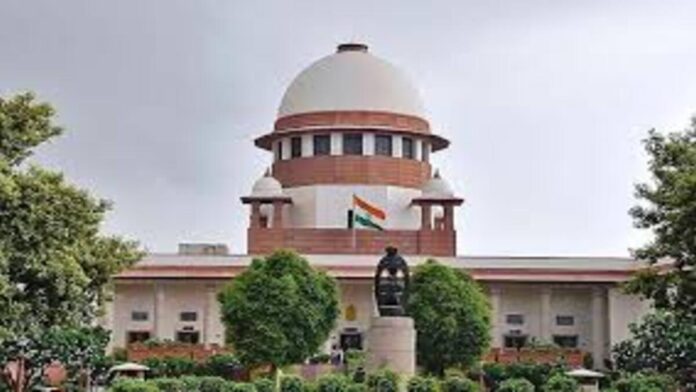The argument that Article 370 of the Constitution ceased to be in effect once the term of the constituent assembly of Jammu and Kashmir expired in 1957 after the state’s Constitution was drafted was deemed “unacceptable” by the Supreme Court on Tuesday.
When senior attorney Dinesh Dwivedi, speaking on behalf of intervenor Prem Shankar Jha, argued that nothing of Article 370, which granted the erstwhile state special status, survived once the Constitution of J-K was enacted on January 26, 1957, and the term of the state’s constituent assembly ended, the remark by a five-judge bench headed by Chief Justice DY Chandrachud came into play.
Jha raised the legal question of whether Article 370 ceased to operate or exist following the enactment of the Constitution of J&K and the dissolution of the constituent assembly. Jha has challenged the August 5, 2019 decision of the Centre to repeal Article 370.
The bench began to question the validity of the submissions as a result of this.
The bench, which also included Justices Sanjay Kishan Kaul, Sanjiv Khanna, BR Gavai, and Surya Kant, instructed Dwivedi that the court must examine the discussions held at the Indian Constituent Assembly as well as the intent of the document’s authors in relation to how Article 370 was written.
“I am arguing somewhat differently from what my friends have argued. They want some part of Article 370 to survive. My argument is that nothing survives. All the powers conferred under Article 370, I would show, cease to operate once the Constitution of Jammu and Kashmir was enacted,” Dwivedi said.
The CJI said the consequence of the argument will be that the Constitution of India and its application to Jammu and Kashmir would “stand frozen as of January 26, 1957”.
“Therefore, no further development in Indian constitutional law can at all apply, according to you, to the state of Jammu and Kashmir after 1957. How can that be acceptable?” he said.
The bench told Dwivedi, “You are asking us to read what is not there in Article 370. Your submission is that it will be frozen after the constituent assembly of J-K frames the Constitution but that does not appear to be following. We have to look at the constituent assembly debates in a manner in which Article 370 was framed.” Dwivedi said when the Article was framed, Jammu and Kashmir was in turmoil and the only legal entity was the state government and, therefore, the provision said there should be “consultation and concurrence” on the matters related to Union and concurrent list and those which do not fall under the Instrument of Accession.
“The constituent assembly was about to be set up. Hence, all the decisions which were taken in consultation and concurrence with the state government were to be placed before the constituent assembly of J-K. Therefore, Article 370 was a temporary provision,” he contended.
According to the senior attorney, it is obvious from the provision and the discussions in the constituent assembly that Article 370 was only temporary and ceased to exist after January 1957.
The bench stated that the arguments made by those opposed to the abrogation, who claimed that the clause had gained permanent status after the state’s constituent assembly’s mandate ended, were in direct opposition to what was being submitted.
“This is what is creating a problem. Perhaps our thinking in the manner which we have been tuned to think for the past 70 years is that there should be One Nation-One Constitution. But where is that prescribed? It should be prescribed in the Constitution which does not say so,” the senior lawyer said.
CJI Chandrachud then asked can the court say that a speech made by a member of the constituent assembly, however weighty, represented the commitment of India to Jammu and Kashmir.
“This will have a bearing on the interpretation of the Constitution”, the CJI said. Justice Kaul also questioned Dwivedi on his line of argument and said according to him, Article 370 was a defunct provision and no purpose was served having it.
“Yet the provision continued to be there in the Indian Constitution. Constitution Orders (orders applying provisions of Indian Constitution to J-K) have been issued pre-1957 and post 1957. Yet nobody thought about removing it. The association of people with Article 370 was negatory and hence nothing survives. This is your argument?” Justice Kaul summed up Dwivedi’s contentions.
Dwivedi told the bench that past practices would not justify the invalidity of a provision and this is a settled law.
“The law, as I understand, is that however long a past practice is if it is constitutionally illegal, it cannot be justified. What I am trying to show is the intent of our Constitution framers. We cannot read Article 370 dehors (other than) the intent is my question,” he said.
It is difficult to assume, according to Justice Kaul, that the arguments in the state’s constituent assembly amount to a guarantee that Article 370 will dissolve itself after the state’s constitution has been adopted and the constituent assembly’s time has expired. The Jammu and Kashmir Reorganisation Act, 2019, was challenged by senior attorney CU Singh on behalf of Mohammed Yousuf Tarigami and others, arguing that the former state could not be split into two union territories.
The hearing will proceed on Wednesday despite its continued impasse.
A Constitution bench received several petitions in 2019 that contested the repeal of Article 370’s provisions and the Jammu and Kashmir Reorganisation Act, which divided the former state into Jammu and Kashmir and Ladakh, two union territories.




